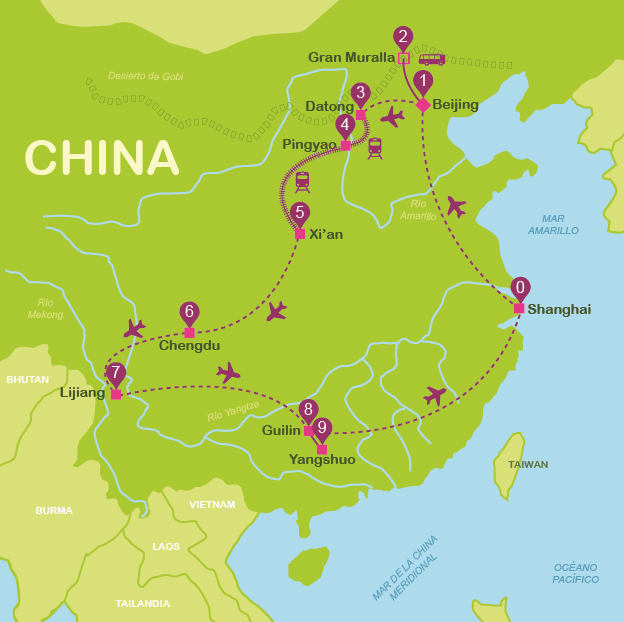Recommended books and movies:
Below is a list of novels and films that we recommend reading or seeing before your trip, or even while on it. They are not travel guides, nor are they interminable historical works. Rather they are personal recommendations that will help you to enjoy your trip even more.
- The Last Emperor: film based on the autobiography of Aisin-Gioro Pu Yi or Puyi, From Emperor to Citizen, and directed by Bernardo Bertolucci. It relates the experiences of the last Chinese emperor, who assumed the throne at the age of three and was worshipped by more than 500 million people as a god. It deals first with the way in which he ruled within the Forbidden City, later relates how the Republican forces that wanted to abolish the imperial court imprisoned him within its walls, and finally shows what happened when China's Communist Revolution came to pass. It was the first film that the Chinese authorities granted permission to be filmed inside the Forbidden City. Buy the movie The Last Emperor.
- Crouching Tiger, Hidden Dragon: Chinese martial arts film directed by Ang Lee in 2000 which revolutionized action movies worldwide, creating an aesthetic of movement that later was subtly mimicked in The Matrix. This fictional tale set during the period of the Qing Dynasty (end of the 17th century) features legendary warriors endowed with supernatural powers. A very good way to get an idea of ancient Chinese culture. Buy the movie Crouching Tiger Hidden Dragon.
- Hero: Mega-production by Zhang Yimou, at the moment considered within China to be the best Chinese film director. It tells the story of the first Chinese emperor who united the seven kingdoms, and is an unadulterated example of Chinese aesthetics and philosophy. You'll love it.
- Mao's Little Red Book: those of you interested in philosophy or politics will enjoy reading Mao. A journey parallel to the one you'll take through China, though in this case via the mind of the man who changed the country forever, turning it into something unmatched anywhere else in the world.
- Man, not God: a brutal testament to what Mao was like in private. Written by his bodyguard Li Yinqiao, Mao asked only one thing of him: not to write anything about him until he died. And he didn't. Very interesting.
- Death of a Red Heroine: written by Qiu Xiaolong. Stylistically simple (and sometimes poorly translated), it is a pleasant way to become immersed in the life of the Chinese urban middle class. It relates the investigations of a detective in Shanghai surrounding a death about which it's best if we don't anything else. Buy the book Death of a Red Heroine.
- I-Ching: Chinese book-oracle containing texts dating back as far as 1200 B.C, it is the equivalent of the Bible, the Koran or the Torah. For those who believe in fortune as understood by Chinese philosophy or are simply interesting in culture, history and religion. Rather than a book to be read, it's one to be consulted. Through a small game, the "reader" is directed to one of the thousands of short fables or stories that make up the I-Ching. One is then supposed to draw a lesson that will provide useful knowledge for making correct decisions regarding the dilemma one faces. Buy the book I Ching.
- Balzac and the Little Chinese Seamstress: moving semi-autobiographical novel by Dai Sijie of the life two teenagers sent to the mountains to be re-educated during the Maoist period. Buy the book Balzac And The Little Chinese Seamstress.

